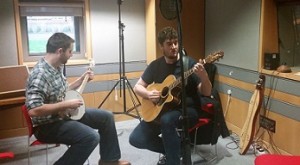— featured article —
Research Reflections: A Transmedia Residency At The British LibraryAs a Digital Curator in the British Library’s Digital Scholarship department it is my role to encourage and support innovative, creative use and reinterpretation of the Library’s vast collections. Furthermore, my specific areas of personal research interest are how virtual and augmented reality technology, videogames and interactive fiction can be used to share British Library content in new ways and with new audiences. I was therefore very pleased to collaborate with Rob Sherman during his Creativeworks London Creative Entrepreneur Residency in the Library. As I was keen to explore how transmedia practices and collaborative creativity can enrich visitor experiences and understanding of cultural heritage institution collections and exhibitions. Rob’s aims were to produce an original body of artistic work in reaction to the Lines In The Ice exhibition (November 2014 – April 2015). This exhibition displayed items relating to Arctic exploration expeditions, including John Franklin’s ill-fated voyage to find the Northwest Passage in 1845. In a hybrid physical/digital installation called On My Wife’s Back, Rob Sherman created a narrative around the fictional explorer Isaac Scinbank, supposedly commissioned to search for John Franklin’s missing expedition. The residency used many different media including digital games created using the open-source Twine game engine, content distributed from a digital “cairn”, which was built using a Raspberry Pi and hidden in the exhibition space. There was an artistic collaboration with British Library book conservators to make a faux-historical diary, which we called the “salmon book”, installed it in the gallery as an ‘exhibit’ and which Rob periodically updated with Scinbank’s diary entries.
The residency provided not only an alternative perspective on the historical events covered in the exhibition, but it also challenged the Library’s internal culture; questioning its own practices and appetite for innovation. Rob and I are currently focusing on sharing our evaluation of the project and we are writing an article for Convergence, The International Journal of Research into New Media Technologies, a quarterly peer-reviewed academic journal that covers the fields of communications and media. As we hope that our evaluation of this residency’s methods will be insightful to libraries, archives and museums, as well as creative practitioners, including transmedia writers, who work in cultural heritage spaces to create new narratives and immersive experiences inspired by historic collections. Author: Stella Wisdom, The British Library Picture caption: Rob Sherman (right) recording songs at the British Library |
— more news —
|
Creativeworks London is one of four Knowledge Exchange Hubs for the Creative Economy funded by the Arts and Humanities Research Council (AHRC) to develop strategic partnerships with creative businesses and cultural organisations, to strengthen and diversify their collaborative research activities and increase the number of arts and humanities researchers actively engaged in research-based knowledge exchange.
